This question serves as a follow-up to a previous question.
I am trying to create a program that converts from one currency to another.
First, I'll post and explain the relevant code, then describe the desired outcome and some problems I came across.
do {
try {
invalidInput = false;
String line = input.nextLine();
Scanner lineScan = new Scanner(line);
BigDecimal moneyInput = lineScan.nextBigDecimal();
// second do-while loop that tries to emulate the outermost do-while loop
// introduces a second set of nested scanners
// re-prompts user for valid currency if they try a blank input
do {
try {
String line2 = input.nextLine();
Scanner lineScan2 = new Scanner(line2);
String currency = lineScan2.next();
if (currency.equals("USD")) {
// convert USD to CNY
} else if (currency.equals("CNY")) {
// convert CNY to USD
}
} catch (NoSuchElementException e) {
invalidInput = true;
System.err.print("Please enter a valid CURRENCY: "); // prompts user for currency ONLY
}
} while (invalidInput);
} catch (NoSuchElementException e) {
invalidInput = true;
System.err.print("Please enter the VALUE followed by the CURRENCY: ");
}
} while (invalidInput);
The outer do-while loop runs as long as invalidInput is true. At the beginning of the first try block, invalidInput is false, and it remains false unless the user enters an invalid input (e.g. blank input or non-numeric). Here, invalidInput becomes true, and the program loops back to the top of the try block after re-prompting the user for both moneyInput and currency.
Next, I wanted to find someway to check the validity of moneyInput and currency separately. The first set of nested Scanners is meant to process moneyInput. If the user inputs something invalid, it will re-prompt the user Please enter the VALUE followed by the CURRENCY:, and it will continue to do so until something valid is entered.
I then wanted to add the exact same functionality to check currency exclusively. This is the intended purpose of the second set of nested scanners (lineScan2). If a valid input is entered for moneyInput but not for currency, e.g. 100.00 abc, I'd like the program to retain the value of moneyInput, re-prompt the user for only currency, and continue to do so until a valid currency is entered (including if the user enters a blank input).
Here are some problems I'm running into:
The program is only reading moneyInput in the first line, instead of reading both moneyInput and currency. Secondly, for each input, the user must press [return] twice (note each of the empty lines in between each input).
The program also terminates inconsistently. In the image example above, after it finally accepts a valid moneyInput and currency and converts the value, the program does not terminate. It terminates prematurely if the moneyInput is entered first, followed by an invalid currency on a second line, like so:
But here, it terminates properly after a successful run (although this still isn't exactly right because it only is "successful" if moneyInput and currency are input on separate lines; ideally, the user should be able to enter both on the same line and the program prints the appropriate conversion):
However, one thing the program does do well is responding repeatedly to invalid (specifically, blank inputs):
And actually, in the case above, aside from the fact that [return] had to be entered twice when prompting for moneyInput and that it didn't terminate after a successful run, everything is working exactly as desired:
the user gets to try repeatedly until a valid input, and in the case where
moneyInputis valid butcurrencyis not, the user only has to enter a valid input forcurrency(i.e. they don't have to re-entermoneyInputwhen only thecurrencywas invalid).
So overall I am looking for ways to modify the code above to achieve the desired results. As mentioned in the comment section of the linked question at the very top of this post, another method I tried was another do-while loop inside (in place of the inner do-while loop) to check currency, and this worked except for when a blank input was entered, which is basically problem I had at the beginning of that post (here is my code: pastebin.com/raw/CT0qjBPk and example screenshots: imgur.com/a/mjfaL).
Sorry if this post is excessively specific and lengthy. I am a beginner programmer and trying to study Java as thoroughly as possible, and this process of improving code has been of great educational value. Thanks so much for reading and providing feedback.



